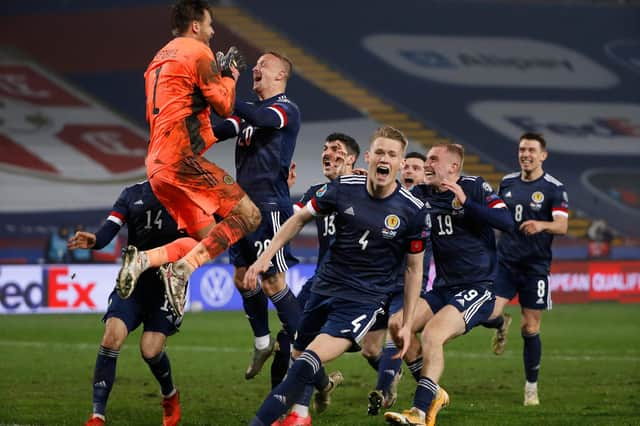You don't have to vote Yes to support Scotland - Brian Monteith


I’ll never forget the clouds of cinder ash as we jumped up and down to celebrate the two own-goals, or the ribald songs about English football pundit Jimmy Hill. The waves of emotion passed through the crowd like a current going to earth and after the final whistle there was general delirium.
I have had many more trips to cheer on the Scotland team with varying degrees of success, both at home and abroad – but that first Hampden match is probably the most vivid, even though it was some 46 years ago.
Advertisement
Hide AdAdvertisement
Hide AdLikewise, I have followed the Scottish rugby team – including being at Twickenham in 1983 when we last beat England there, and the last two Grand Slam winning games – as well as supporting Scottish Cricket.
I give no ground to anyone who impugns my love for Scotland’s sports teams – or indeed, Scottish entrants in any competition, be it snooker, darts, golf, tennis, motorsports – or Mastermind and Strictly Come Dancing. I don’t think this patriotic trait makes me special, I think it is a fairly normal approach for most Scots.
Nor does it limit my appreciation for our opponents. I don’t have to wish failure upon them, I simply want Scots teams or individuals to do better, to excel. Schadenfreude – taking enjoyment from the misfortune of others – is not a particularly attractive look, although I have succumbed to it once or twice. In the main, though, I avoid it because I have known all too often as a Scotland (and Hibernian) supporter the pain of defeat (especially at Hampden).
So when the Scotland football team defeated Serbia last week to qualify for the first international football tournament for 23 years I imbibed a celebratory drink.
Now I look forward to watching the team next year gubbing their opponents and winning the trophy – well, you have to start with self-belief and ambition!
I shall once more look out that trusty tartan scarf and be a devout Scotland cheerleader, sharing in the emotional experience with the wider family of Scots, and anyone who is an adopted Scot, when our team plays.
I explain all of this because I know what is coming, indeed, I have seen it already on the front page of one of yesterday’s papers – the marginalisation of people supporting the Scotland team who do not support secession from the United Kingdom.
Supporting the Scotland team up until and during the tournament is going to be weaponised by nationalists – and if you are not a believer in independence you are going to be called a 90-minute patriot, or be hit by worse phrases that involve expletives before the word “English” and “Tory”.
Advertisement
Hide AdAdvertisement
Hide AdSuch behaviour appeared during the 2014 referendum and it has never really gone away – now it is going to get worse. This is what nationalism has done to Scotland.
Already some separatists are rubbing their hands, thinking Scotland’s qualification is good for the SNP and good for independence – but I strongly disagree.
In fact I think the Scotland team and what it has been able to achieve thus far is a model lesson in how Scotland, as a fully paid-up founder member of Great Britain and then the United Kingdom, benefits from our participation in the greatest political and social union that history has known.
The Scotland team is not solely made of Scots players playing in Scotland but has about 70 per cent of its players playing in the English leagues, where they undoubtedly benefit from additional resources, different influences in coaching and a competitiveness that takes them to higher levels than is possible for most Scots playing only in Scotland. Kenny Dalglish was great at Celtic but even better at Liverpool, to use an example from my generation.
Yet if the SNP has its way Scots playing in England won’t have a say in the future of our country, they will be of less value.
Since the SNP was elected to power at Holyrood in 2007 the last 13 years have been used to diminish all aspects of British culture and to elevate any sense of difference between Scots and the rest of our brothers and sisters in the UK.
Obvious examples include the use of Gaelic signage where it has little, if no, relevance, and the elevation of nationalists into every nook and cranny of civic society.
Our saltire flag has intentionally been purloined, through its waving by Blood and Soil Anglophobes at the Border or over motorway bridges and at Nuremberg-scale flag-waving displays in marches, making it challenging for the majority of Scots who support Scotland being in the UK to display it for fear of being mistaken for nationalists or making a false political statement.
Advertisement
Hide AdAdvertisement
Hide AdWhat British solidarity means is that when the Scotland team beats England at Wembley next year practically all English people will then give their support to Scotland, just as the rest of Britain gave its support to the Welsh team that reached the semi-finals in the last tournament.
Scotland’s football success is not a vehicle for inward-looking nationalism, but for self-confident patriotism – Scottish patriotism, but for many also British patriotism. Supporting Scotland can and must be shared by all – putting our politics behind us.
Sadly, there is more chance of our team lifting the trophy than of such harmony prevailing.
Brian Monteith is editor of ThinkScotland.org
A message from the Editor
Thank you for reading this article. We're more reliant on your support than ever as the shift in consumer habits brought about by coronavirus impacts our advertisers.
If you haven't already, please consider supporting our trusted, fact-checked journalism by taking out a digital subscription.
Comments
Want to join the conversation? Please or to comment on this article.